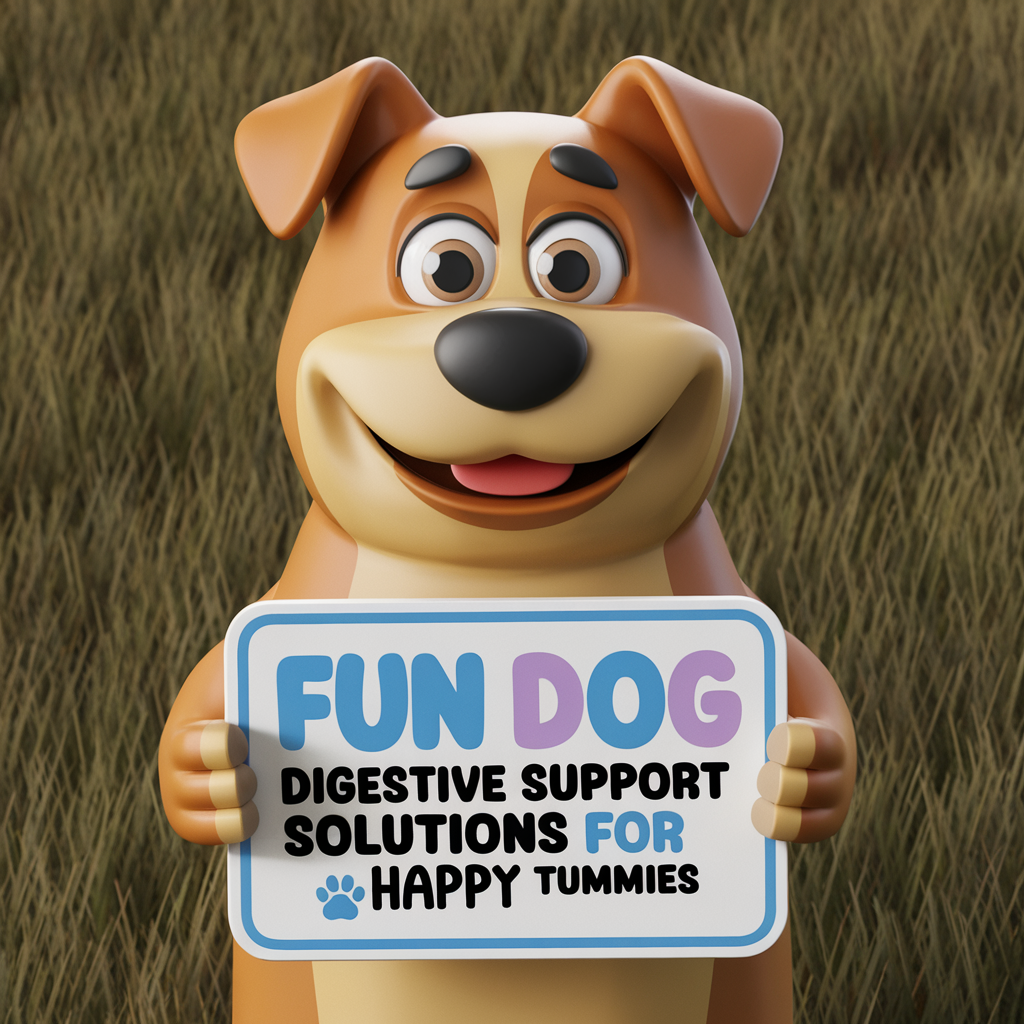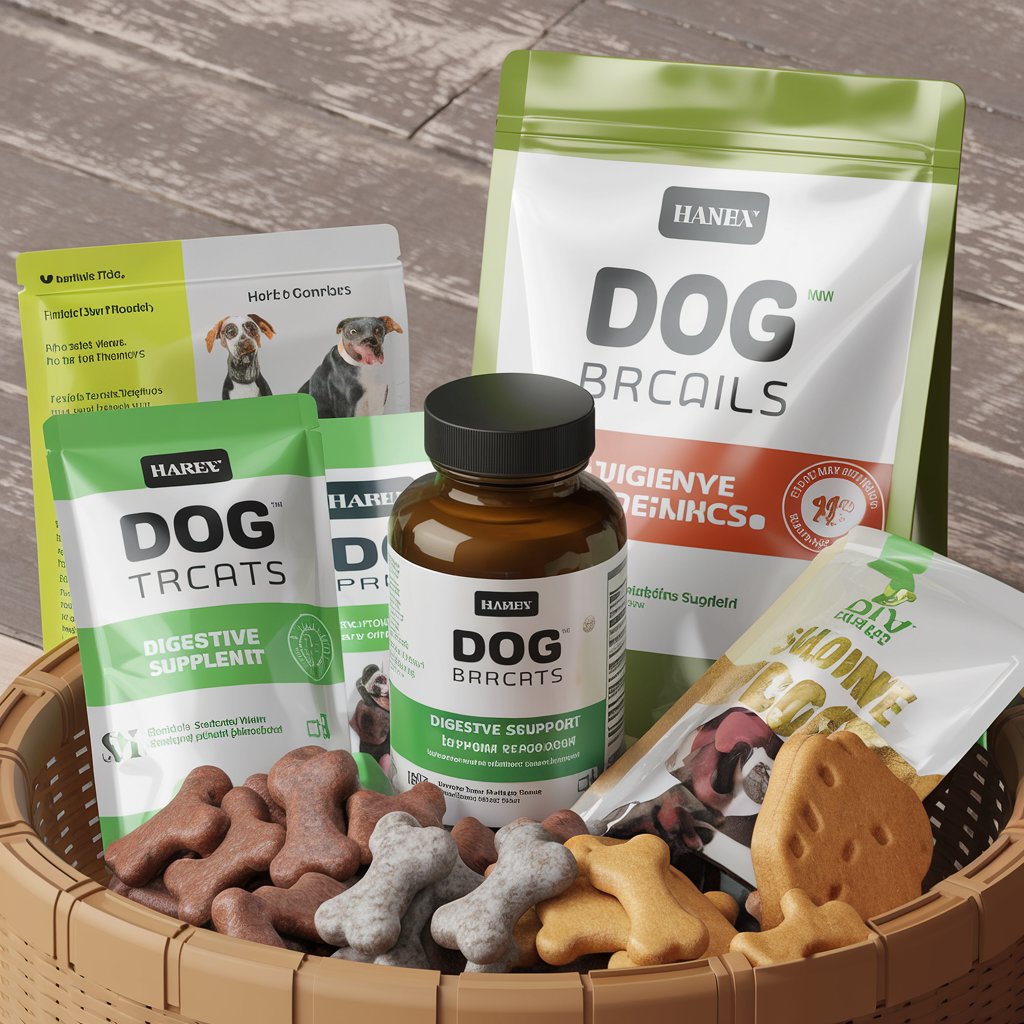As dog lovers, we all want our furry friends to be happy, healthy, and full of life. But sometimes, our dogs can face digestive issues that can make them uncomfortable and unhappy. Knowing the signs of poor digestion and understanding when your dog might need digestive support is key to keeping them in top shape. Let’s dive into the world of doggy digestion with a sprinkle of humor and a whole lot of love.
Understanding Dog Digestive Health
Dog digestion is a fascinating yet complex process that plays a critical role in overall health. When everything is running smoothly, your dog is happy, energetic, and thriving. But when things go awry, it can lead to a host of issues that can be a real pain in the tail.
So, how do you know if your dog’s digestion needs a little help? Here are the common signs to watch out for:
1. Frequent Gas and Bloating
We all know that occasional gas is normal for dogs (and humans!). However, if your pup is clearing the room regularly, it could be a sign of digestive trouble. Frequent gas, especially when accompanied by bloating, might indicate your dog is struggling to process certain foods.
Solution: Consider switching to a diet that is easier on their stomach. Foods that are high in fiber or contain probiotics can often help reduce gas and improve digestion. Digestive enzymes can also work wonders by helping your dog break down food more efficiently.
2. Vomiting
A dog throwing up every now and then isn’t usually a cause for concern—dogs sometimes vomit to rid themselves of something unpleasant they’ve ingested. However, if vomiting becomes frequent, it may signal a deeper digestive issue.
Solution: First, eliminate any potential dietary triggers such as new treats or table scraps. You might also try feeding smaller, more frequent meals to avoid overwhelming your dog’s stomach. If vomiting persists, it’s time to consult your vet for a proper diagnosis and treatment plan.
3. Diarrhea
Diarrhea is a messy problem that no pet parent enjoys dealing with. While occasional diarrhea can be normal, frequent bouts could mean your dog’s digestive system is off balance.
Solution: Switching to a bland diet temporarily can help soothe your dog’s stomach. Plain boiled chicken and rice are often recommended. Additionally, probiotics can be introduced to help restore healthy gut bacteria.
4. Constipation
On the flip side, if your dog is straining to poop or has dry, hard stools, they might be constipated. Constipation can be uncomfortable and is often a sign that your dog’s diet lacks fiber or that they’re not getting enough water.
Solution: Ensure your dog is drinking plenty of water. Adding canned pumpkin to their diet is a great natural way to increase fiber intake. Regular exercise also promotes healthy digestion.
5. Loss of Appetite
A sudden disinterest in food can be concerning. If your dog’s appetite takes a nosedive, it might be due to an upset stomach or another digestive issue.
Solution: Encourage your dog to eat by offering bland, easy-to-digest foods like boiled chicken or low-sodium broth. If they still refuse to eat or if the loss of appetite continues, a visit to the vet is warranted.

6. Weight Loss
Unexpected weight loss is a red flag that something isn’t right with your dog’s health. Digestive problems can prevent your dog from absorbing the nutrients they need from their food, leading to weight loss.
Solution: Work with your vet to identify the underlying cause. Adjusting their diet to one that is more nutrient-dense and easier to digest can help your dog regain weight and energy.
7. Bad Breath
Bad breath isn’t just a cosmetic issue—it can be a sign of digestive problems. If your dog’s breath is consistently foul, it might be due to a build-up of bacteria in the gut.
Solution: Oral hygiene is important, but so is addressing the root cause. A diet rich in prebiotics and probiotics can help balance the bacteria in your dog’s gut, leading to fresher breath.
8. Lethargy
Dogs with digestive problems often don’t feel like their usual bouncy selves. If your dog seems unusually tired or lacks energy, it could be due to digestive discomfort.
Solution: Ensure your dog is eating a balanced diet that meets all their nutritional needs. Adding digestive supplements can also help improve their energy levels by promoting better nutrient absorption.
9. Pica (Eating Non-Food Items)
Dogs eating grass, dirt, or other non-food items is known as pica. This behavior can be a sign that your dog’s diet isn’t meeting their nutritional needs, leading them to seek out alternative sources.
Solution: Evaluate your dog’s diet to ensure they’re getting all the necessary nutrients. You might also consider adding a digestive aid or supplement to help them better absorb what they’re eating.
10. Skin Issues
Did you know that your dog’s skin health is often linked to their digestive system? If your dog has recurring skin problems like itching, rashes, or dull fur, it might be a sign of poor digestion.
Solution: Omega-3 fatty acids can work wonders for both digestion and skin health. Adding fish oil or flaxseed oil to your dog’s diet can help soothe their skin and improve their overall digestive health.
How to Support Your Dog’s Digestive Health
Now that we’ve covered the signs, let’s look at how you can support your dog’s digestive health. Here are some tried-and-true methods:
Probiotics and Prebiotics
Probiotics introduce beneficial bacteria to your dog’s gut, while prebiotics feed the existing good bacteria. Together, they can help balance your dog’s gut flora, improve digestion, and boost overall health.
Digestive Enzymes
Digestive enzymes help break down food so that your dog can absorb nutrients more efficiently. They can be particularly beneficial for dogs with pancreatic insufficiency or older dogs whose natural enzyme production has decreased.
High-Quality Dog Food
Feeding your dog a high-quality, well-balanced diet is one of the best things you can do for their digestive health. Look for foods that are free from fillers, artificial preservatives, and low-quality ingredients. Consider grain-free options if your dog has a sensitivity to grains.
Fiber
Fiber is crucial for healthy digestion. It helps regulate bowel movements and can prevent both constipation and diarrhea. Pumpkin, sweet potatoes, and certain green vegetables are excellent sources of fiber for dogs.

Hydration
Water is essential for digestion. Ensure your dog always has access to fresh, clean water. If your dog isn’t drinking enough, try adding a splash of low-sodium broth to their water bowl.
Regular Exercise
Exercise isn’t just good for your dog’s muscles—it’s great for their digestion too. Regular physical activity helps keep the digestive system moving and can prevent constipation.
When to See the Vet
While dietary changes and supplements can significantly improve your dog’s digestive health, some cases require professional intervention. If your dog’s symptoms persist or worsen, it’s essential to seek veterinary advice. Chronic digestive problems can lead to more severe health issues if left untreated.
Conclusion
Keeping your dog’s digestive system healthy is vital for their overall well-being. By being aware of the signs that your dog might need digestive support and taking proactive steps to address these issues, you can ensure that your furry friend stays happy, healthy, and full of life.
So, the next time your dog gives you that “something’s not right” look, remember that their digestive health could be at the root of the problem. With the right care, you can keep your dog’s tail wagging and their tummy happy!












Discussion about this post